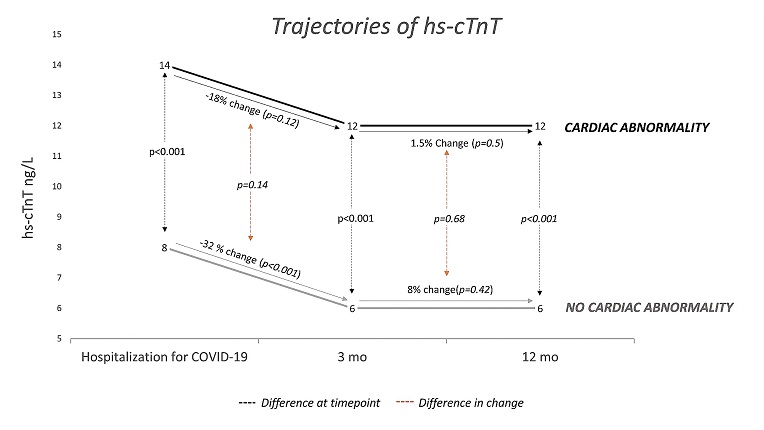Norwegian Study Shows That Cardiac Troponin T Can Be Used As A Biomaker In Moderate-To-Severe COVID-19 To Determine Potential Heart Issues
Nikhil Prasad Fact checked by:Thailand Medical News Team Apr 16, 2024 1 year, 9 months, 2 weeks, 5 days, 47 minutes ago
COVID-19 News: The outbreak of COVID-19 has sparked numerous investigations into its multifaceted impacts on human health. Among the myriad of effects associated with this viral infection, cardiovascular implications have garnered significant attention. One area of interest is the behavior of cardiac troponin T (cTnT), a biomarker indicative of myocardial injury. Elevated cTnT levels have been observed in patients with COVID-19, raising questions about potential cardiac involvement and long-term consequences.
 Trajectory of cardiac troponin T following moderate-to-severe COVID-19 and the association with cardiac abnormalities
Trajectory of high sensitivity cardiac troponin T (hs-cTnT) from peak concentration during hospitalization for COVID-19 to 3 and 12 months after discharge. Stratified by the presence of cardiac abnormality after 3 months and presented as geometric mean. Patients with hs-cTnT available at all time points (n = 125).
Background and Objectives of the Study
Trajectory of cardiac troponin T following moderate-to-severe COVID-19 and the association with cardiac abnormalities
Trajectory of high sensitivity cardiac troponin T (hs-cTnT) from peak concentration during hospitalization for COVID-19 to 3 and 12 months after discharge. Stratified by the presence of cardiac abnormality after 3 months and presented as geometric mean. Patients with hs-cTnT available at all time points (n = 125).
Background and Objectives of the Study
This
COVID-19 News report covers a recent study by researchers from multiple institutions in Norway, including Akershus University Hospital, the University of Oslo, and others, who collaborated to delve into this complex interplay between COVID-19 and cardiac troponin T. Their primary objective was to understand how high-sensitive cardiac troponin T (hs-cTnT) concentrations correlate with cardiac dysfunction and structural abnormalities post-hospitalization for COVID-19. Additionally, they aimed to evaluate hs-cTnT's efficacy in ruling out cardiac pathology.
Methodology: Examining Patients and Assessing Cardiac Health
The study involved a cohort of 189 patients hospitalized with COVID-19. These individuals underwent hs-cTnT measurements during their hospital stay and at 3- and 12-month follow-up visits. Additionally, they underwent echocardiographic studies, and a subset received cardiovascular magnetic resonance imaging (CMR) after six months. Cardiac abnormalities were defined based on various parameters, including left ventricular hypertrophy or dysfunction, right ventricular dysfunction, and CMR late gadolinium findings.
Findings and Interpretations: Unraveling the Insights
The study's findings provided several key insights into the relationship between hs-cTnT and cardiac health post-COVID-19:
-Association with Cardiac Abnormalities: Higher hs-cTnT concentrations during convalescence were associated with cardiac pathology, indicating a potential link between COVID-19 severity and lasting cardiac effects.
-Decrease in hs-cTnT Levels: Interestingly, hs-cTnT levels decreased significantly from hospitalization to three months post-discharge, especially in patients treated in intensive care units (ICUs). This suggests a transient nature of hs-cTnT elevation related
to acute illness.
Role in Ruling Out Cardiac Pathology: Hs-cTnT levels below a certain threshold (<5 ng/L) showed a high negative predictive value for ruling out cardiac abnormalities after COVID-19, providing a potentially useful tool in clinical assessments.
-Persistent Dyspnea and Cardiac Abnormalities: The study also explored the relationship between persistent dyspnea (a symptom in Post-Acute COVID Syndrome) and cardiac abnormalities, finding a significant association between hs-cTnT levels and the presence of cardiac pathology in dyspneic patients.
Contextualizing the Findings and Implications
These findings contribute significantly to our understanding of post-COVID-19 cardiac health. They suggest that while elevated hs-cTnT during acute illness may reflect severity and acute myocardial injury, hs-cTnT levels during convalescence could serve as markers for lasting cardiac effects. Moreover, the study underscores the importance of hs-cTnT in risk stratification and clinical decision-making regarding post-COVID-19 cardiac assessments.
Strengths, Limitations, and Future Directions
The study's strengths lie in its prospective design, inclusion of unselected patients, and comprehensive cardiac evaluations. However, limitations such as survival bias and lack of pre-COVID cardiac health data highlight areas for further research. Future studies could explore longitudinal hs-cTnT trends beyond 12 months and investigate potential interventions based on hs-cTnT levels in post-COVID-19 cardiac management.
Conclusion: Insights and Clinical Implications
In conclusion, the Norwegian study sheds light on the nuanced relationship between hs-cTnT and cardiac health post-COVID-19. It emphasizes the dynamic nature of hs-cTnT levels, their role in predicting cardiac pathology, and their potential utility in clinical decision-making for post-COVID-19 patients. These findings pave the way for personalized approaches to cardiac care in the aftermath of COVID-19.
The study findings were published in the peer reviewed journal: BMC Cardiovascular Disorders (Springer).
https://bmccardiovascdisord.biomedcentral.com/articles/10.1186/s12872-024-03854-7
For the latest
COVID-19 News, keep on logging to Thailand Medical News.
